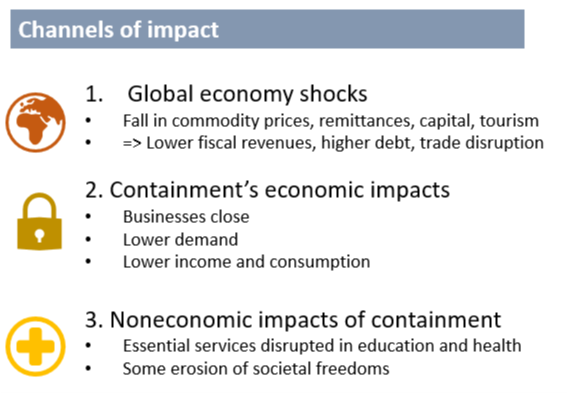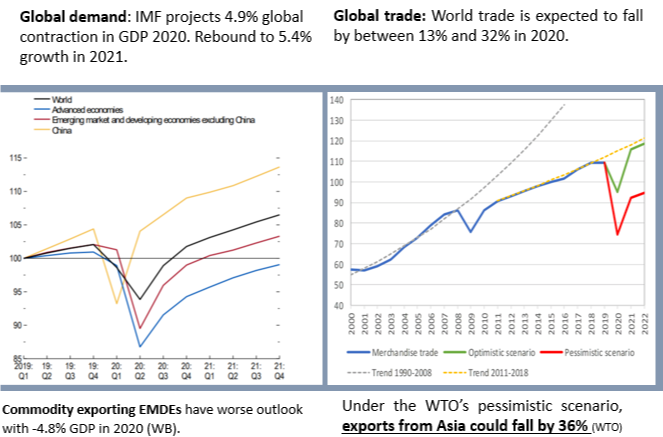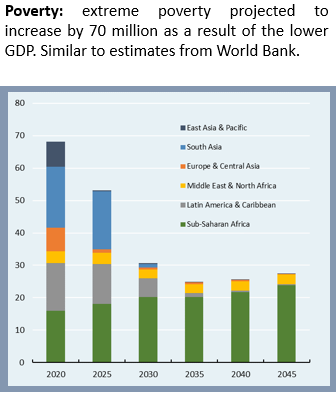I spent some time today putting together thoughts for someone interested in the evidence on how to help low income countries (LICs) grow and I thought there might be wider interest so here goes a thread.
Achieving a higher growth rate is the holy grail of econ but...1/many
Achieving a higher growth rate is the holy grail of econ but...1/many
most economics models assume interventions can only improve a country's level of income not permanently increase growth. That is because they assume diminishing returns to capital. The first spade makes a farmer much more productive (vs hands), the second not so much...2/N
Even better policies (eg open trade) can get you higher steady state income but not permanently higher growth.
Despite this, a lot of policy discussion is about how to "kick start" or accelerate growth.
I think the mismatch comes b/c even temp growth spurts are very good. 3/n
Despite this, a lot of policy discussion is about how to "kick start" or accelerate growth.
I think the mismatch comes b/c even temp growth spurts are very good. 3/n
A policy or investment that helps a LIC to catch up to rich countries more quickly is a massive even if does not shift steady state.
But most investments are not going to do even that, even if they have multiplier effects because multipliers die out. 4/n
But most investments are not going to do even that, even if they have multiplier effects because multipliers die out. 4/n
So what can growth theory tell us about what investments might help LICs catch up? Innovation drives growth so investments that increase innovation or take up of innovation are key.
Appropriate prices (ie that reflect social value), trade, education help take up of innov. 5/n
Appropriate prices (ie that reflect social value), trade, education help take up of innov. 5/n
Note that in standard models there is only one global frontier on innovation, but we need different technologies in some sectors in LICs. Eg, LICs have different crops, different diseases, different capital labor/land ratios. So returns to innovation for LICs are high. 6/n
Investment where there are increasing returns to scale can also boost growth temporarily. Belboni's paper with @orianabandiera @ImranRasul3 et al shows increasing returns for individuals over some levels of wealth b/c you cant buy 1/2 a cow. 7/n nber.org/system/files/w…
But its hard to imagine this working at level of a country. If there were increasing returns to scale generally then we would expect that when countries see a positive shock, eg from a commodity boom or cancelled debt this would lead to higher growth for a long time. We dont 8/n
So that leaves us with things that help with take up of innovation: education, getting prices right (which means good policy and thus good politics), and as most people work in agriculture in LICs, take up of innovation in ag. Lets take them one by one. 9/n
Correlational and some RCT evidence people who are more educated take up innovations faster from health (get their kid vaccinated) to ag (use hybrid seed). This is why education is so important. And we know a lot about how to improve education. 10/n
thedocs.worldbank.org/en/doc/231d982…
thedocs.worldbank.org/en/doc/231d982…
There is some promising evidence on how to improve policy and politics at the margin in LICs.
Giving rigorous evidence to politicians helps
11/naeaweb.org/articles?id=10…
Giving rigorous evidence to politicians helps
11/naeaweb.org/articles?id=10…
Giving info to voters changes how they vote & can put pressure on politicians to be more accountable to voters.
(There are lots of +ve results here & some null, my take--influenced by @lwantchekon is it can work & making voters feel engaged is key) 11/n
journals.uchicago.edu/doi/abs/10.108…
(There are lots of +ve results here & some null, my take--influenced by @lwantchekon is it can work & making voters feel engaged is key) 11/n
journals.uchicago.edu/doi/abs/10.108…
Ag is sometimes dismissed by those seeking growth in LICs: who ever grew thro agr? Lots actually. Classic model is productivity in ag creates surplus that funds growth elsewhere. True causality prob goes both ways. Nice paper on role of approp tech in ag
scholar.harvard.edu/files/moscona/…
scholar.harvard.edu/files/moscona/…
We know why ag productivity in LICs is low: little irrigation, new seed or fertilizer. But why is takeup of these innovations low? Lit suggests risk & behavioral biases play a part. Info & credit are minor. Many farmers dont want/arent good entrepreneurs
povertyactionlab.org/policy-insight…
povertyactionlab.org/policy-insight…
Finally, there is intriguing new evidence on role of aspirations and how higher aspirations can drive higher investment and income. The impact of a small video designed to increase aspirations is just amazing. And the authors have tested it in 2 countries
mbrg.bsg.ox.ac.uk/mind-and-behav…
mbrg.bsg.ox.ac.uk/mind-and-behav…
• • •
Missing some Tweet in this thread? You can try to
force a refresh








